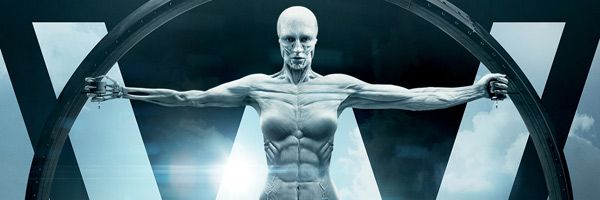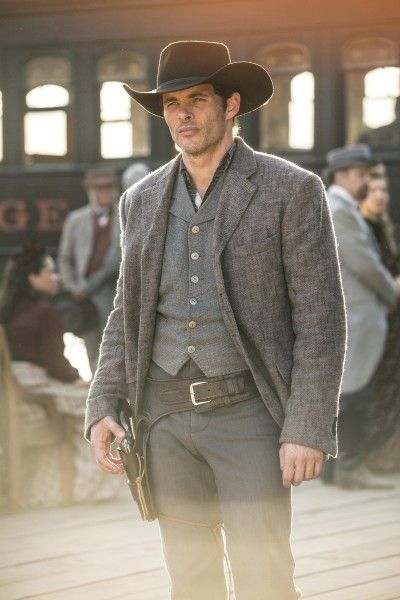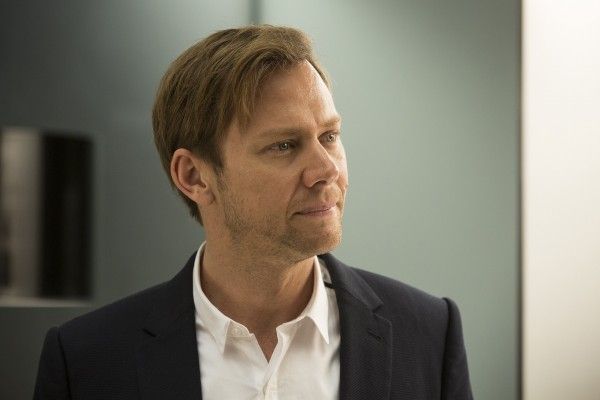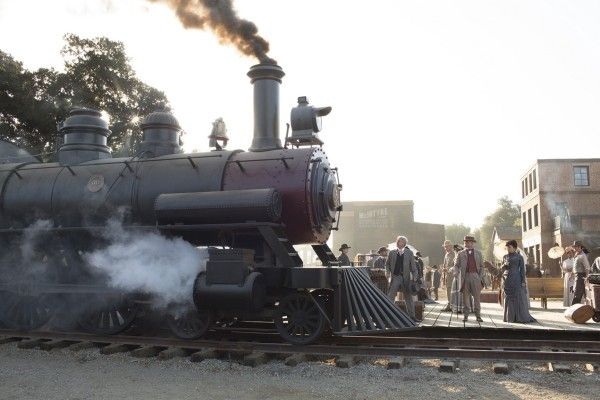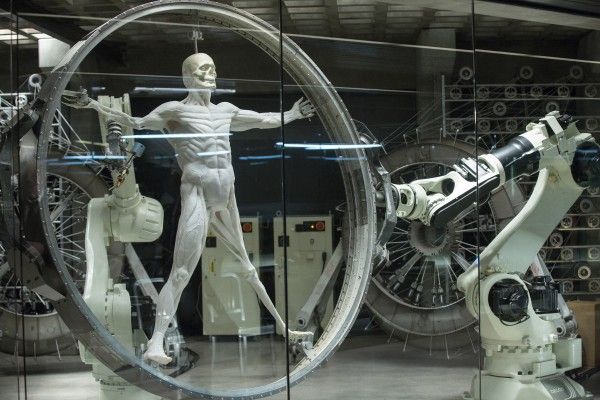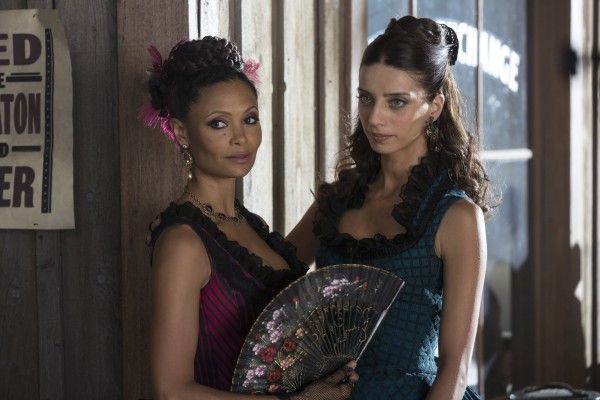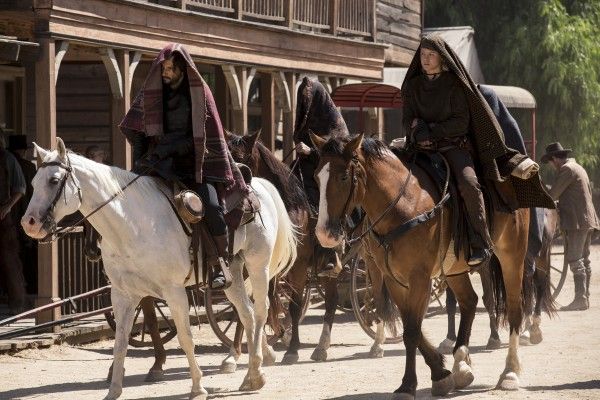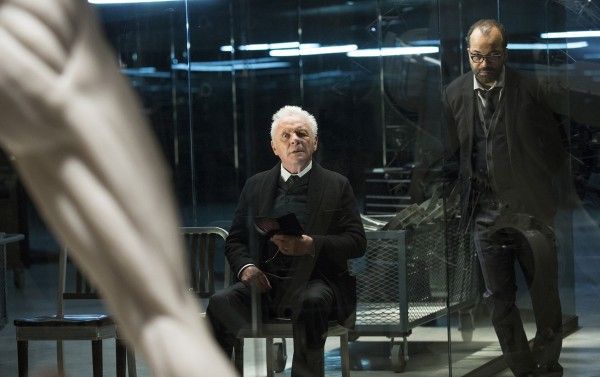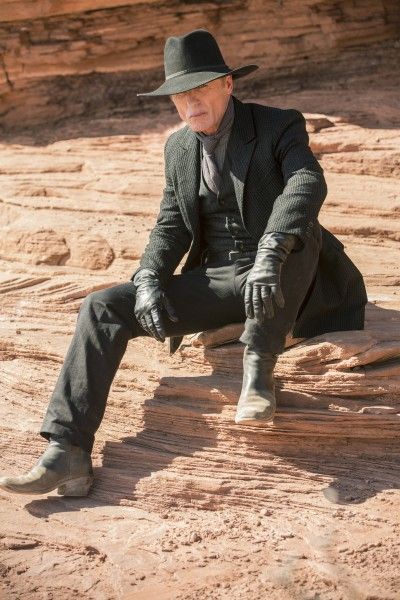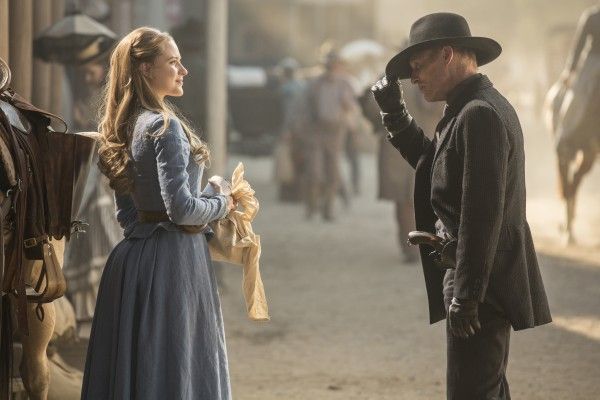Created for television by Jonathan Nolan and Lisa Joy, the HBO drama series Westworld is as ambitious as it is thought-provoking, exploring fascinating themes of humanity and human intelligence, and with a cast that couldn’t get any better. It is a dark odyssey about artificial consciousness, in a world in which every human appetite, no matter how noble or depraved, can be indulged, if you pay the right price. The series stars Anthony Hopkins, Ed Harris, Evan Rachel Wood, Jeffrey Wright, James Marsden, Thandie Newton, Jimmi Simpson, Ben Barnes and Rodrigo Santoro, among many others.
During this exclusive phone interview with Collider, showrunners Jonathan Nolan and Lisa Joy talked about why they wanted to explore this story, deciding the points of view to explore, putting together their dream cast, realizing that they would need to take a production hiatus, in order to catch the writing up to what they were shooting, what needing to take a break taught them about possible future seasons, and making the world feel immersive and visceral. Be aware that there are some spoilers discussed.
Collider: What was the appeal for you guys, in retelling and exploring Westworld, in a very new and very different way?
JONATHAN NOLAN: When J.J. [Abrams] called Lisa and myself, he pitched us this idea of, what if we turn the structure around and started with the hosts. For us, that gave us a way to play with everything that we’re interested in, all at once. It’s the ultimate playground for us because we deal with questions about artificial intelligence, which is something I’ve long been fascinated by, but also human intelligence, or the lack thereof, human behavior, and interactive, immersive storytelling. It was like a candy store. I’d seen the film when I was a kid and really dug it, but this way into it allowed us to really, really get under the hood of some of these questions. We also wanted to explore the guest experience and the techs’ lives and the conflicts with these creatures that they’re interacting with and controlling, but that central idea of seeing A.I. from the inside out was where it was an offer that we could not refuse.
LISA JOY: It’s a timely moment to be exploring the evolution of sentience and artificial intelligence because it doesn’t feel like science fiction, at this point. It feels like an examination of current events. But in addition to that, for me, it was a chance to approach two genres, in terms of the Western and science fiction, from unlikely points of view that I could feel a more visual connection to. The tale of the old West is one often told through the lens of the rugged men who conquered it. Of course, we have a plethora of incredible actors playing really unique characters in this, but the spotlight isn’t just on the male experience in the West. It’s also on the women, and there’s a whole eco-system there that was ripe to be explored.
Did you have a process for deciding not only which characters you wanted to follow through the story, but for whose point of view you wanted to explore the story from and when?
NOLAN: Yeah, totally. The first thing we did was that we laid out the entire corporate structure of the park. It started with the park hierarchy itself. We said, okay, you’d have a narrative department, who are the writers. You’d have a behavior department, who are the programmers of baseline behaviors, details and filigree, but also the core of how you make it all work, in terms of the hosts’ psyches. You’d have a quality insurance department, where they’re making sure there aren’t any glitches or weird things, and that the guests have a great experience and seamless experience. You’d also have security. So, we laid out the corporate structure, and then we cherry-picked from that the people who would be brought into the most conflict and the most day-to-day relationship with each other and with the hosts. And then, building the narrative inside the park, having played a lot of video games and watched a lot of Western, we started from this question of not who are the heroes, because the guests have to be the heroes, and not who are the villains, because the guests are the villains too, but of who the peripheral characters are. We were designing the non-player characters in our game, with an emphasis on who the stock characters are in an immersive Western role-playing game. There is the friendly rancher’s daughter who will happily show you around, a little bit. There is the grey hat cowboy bounty hunter who will guide you out. There is the comic relief ne’er-do-well hosts that will accompany you on some mischief. There is the madam and her boys and girls at the brothel, who will indulge you immediately. We also wanted the scope of the park to be massive. The original film is basically like a little Western backlot. When [Michael] Crichton was making this, the state-of-the-art video game was Pong. Now, we live in this post Grand Theft Auto era, so this is an immersion has to be big enough that you would never find the end of it. It has to have dozens, or even hundreds, of storylines that you can participate in, so that you would always have a different experience. It’s very different from the original film. With this, the heroes and heroines are drawn from this group of peripheral characters that are not supposed to have adventures. They’re supposed to make the guests feel good or attractive, or help them on their way.
JOY: I think there’s a double layer of subverting expectations with point of view in this. We are looking through the West through the POV of characters that are normally the sidekick, the damsel in distress, the helper, and the madam who gives a sassy word or two to people passing through town. In this, they’re not peripheral characters. They’re their own heroes. Each of them has their own agency and history and dreams and fears. We look at it from that POV first. And then, on a broader level, we’re coming to the entire park through the point of view of the robots, who we call the hosts. It’s a double-layered situation of exploring unlikely points of view.
When it came to casting, did you always have a desire to put together a cast of not only hugely talented actors, but also very well known and recognizable actors that would be anyone’s dream cast, or was there a point when you realized that you had a bunch of roles that would entice actors that might not otherwise have been interested in doing a TV series?
NOLAN: When it came to casting, we did it the old-fashioned way. We thought about the actors that we’d love to see in these roles and the actors that we’d love to work with, but we wrote the script first. I find thinking about specific actors while you’re writing to be distracting, but we thought a little bit about Anthony Hopkins before. We thought, “If we’re gonna do this character the way we want to do him, we’re gonna need someone great.” That went for all of these roles, really, but if we were going to find someone to play God, he had to be pretty impressive. We thought about the roles, in terms of who our dream cast was, and we sent them the script and they all said yes. That was a first for me.
JOY: We feel really fortunate. They’re such incredibly talented actors. What we try to bring on the page, they bring to life in totally new dimensions. We lucked out, in the biggest way, because each of them is a gem, personally, and a pleasure to work with. We feel incredibly fortunate to be working with them.
There’s been a lot of discussion and speculation about why you guys decided to take a hiatus during production, and you’ve been pretty clear that you needed the writing to catch up with the production side of things. When did you realize that was going to be something that you were going to need to do, and was HBO immediately open to you taking the time that you felt you needed?
NOLAN: Yeah, we’re very fortunate to be working with an incredible network with an incredible legacy of shows and an unbelievably supportive disposition towards the writers and producers, and making sure that we had everything we needed, every step of the way, to make this show as ambitious as possible. One of the things we hadn’t counted on was the complexity of the production. I’ve done TV before, and normally you can write and shoot, at the same time. This was a little more complicated. We started shooting fairly early in the process, and it’s a beast of a show, but a glorious beast of a show. We had a great team, a great crew, and a cast who’s incredibly patient and supportive. Everyone was just pointed in the same direction, trying to make this show as ambitious and complete as possible.
JOY: This show is such a behemoth, and you’re dealing with so many extras and such a large, ambitious scope. You’re not just creating an entire Western world, you’re also creating a contemporary technological world. It’s basically like doing a couple of very ambitious shows, or movies, simultaneously. We got really lucky with our crew, your production designer and costumes. Everybody pulled together, in every division, and worked together really hard. They did an amazing job in bringing in all to life.
After you were able to get ahead in the writing, did you need to go back and reshoot anything from the episodes you had already shot?
NOLAN: I think we had one or two additional pieces to pick up that were location contingent. With a production like this, you’re shooting episodes simultaneously and you’re trying to build in as much efficiency as possible. We went out to Utah for the pilot, and then we went back out to Utah to shoot pieces for all of the episodes. So, we had a couple of pieces to pick up that we hadn’t had a chance to get to. And then, we were able to push ahead with the last three episodes.
After realizing just how ambitious this story was, and taking that time to catch the writing up to reflect that, what did that teach you about how you’ll have to approach future seasons? Did that give you a different perspective on what you’ll need, going forward?
NOLAN: For us, it’s a different animal. When you make a movie, you write the script first, hopefully, and then you go make the movie. A movie that they’re writing as they go usually doesn’t work out very well. In television, you’re writing and producing simultaneously. In truth, this is somewhere in between. So for the second season, we’re going to write everything that we can, so when we go into production, we’ll have all the scripts and be able to block shoot, which is hugely important to us. There’s a ton of beautiful visual effects work in the show, but for the most part, we like to use visual effects in the way nature intended, which is not as the main dish, but as the finishing pieces. So, we like to shoot on location where we can, and by having more written before we start, we’re hopeful. We’d love to go back and shoot even more in Utah, in the second season, should we be so lucky.
At least in the first four episodes, we don’t really get to see any of the outside world or who any of the guests or the people working behind the scenes are, outside of their life in or related to Westworld. Is that very intentional, and what do you hope to achieve with that, as far as the viewing experience goes?
JOY: Yeah. Throughout this, looking at point of view has been really important to us and the way in which we’ve constructed the series. For the most part, especially in terms of the hosts, we’ve tried to limit our understanding of the world, and by that I mean the audience’s understanding of the world, to the same aperture as what a host would be experiencing the world as. So, we try not to get too far ahead from the creatures that we’re watching on screen. That way, the reveals come simultaneously for us, as they do for the characters we’re depicting. It was very much a conscious stylistic choice. When dealing with writing and depicting artificial intelligence and robotic humans, in this case, you have to be very careful, especially in our show, where they’re really the protagonists, in creating that connection with the audience, so that the audience doesn’t dismiss that as other and lose that empathy and that visceral connection with them. For us, it was really a fine-tuned process of how life-like they should be and when we should reveal their small glitches, in a way that it doesn’t, all of a sudden, jar the audience out and make us lose sympathy for them. Manipulating POV so that we feel grounded in that same reality is one way of achieving that.
The violence on this series, whether it be sexual or physical, is often terrifying and horrific, and it really helps you feel for the hosts. Was it important to you not to over-glorify that aspect of the story?
NOLAN: Yeah. Part of what are playing with here is the idea that whenever this story is taking place is that Westworld is more real, more immersive, more sensual and more violent than the real world. When you’re there, it feels really real. So, we wanted to depict those aspects of it tastefully, but we also wanted them to feel visceral. Part of what’s happening here is that the trauma for the hosts is significant and that’s a big part of the story, so you want to feel that sympathy. We didn’t want that to feel comic. There are some place in which we’re playing some of the depravity of the situation in that way, but for the most part, we’re playing it in a way where you really do sympathize with the plight of the hosts. They didn’t choose to be in this place, and they don’t understand that the joke is on them. If you look at contemporary gaming, it’s a journey that’s similar, not just in the level of gore and realism, but also in terms of the level of sophistication of the non-player characters. Every game has a physics engine and a graphics engine, but it also has an A.I. engine and it has limited A.I. that’s powering those NPCs. They have conversations whether the player is there to hear them or not. In a sense, they’re already starting to take on some agency of it. It’s obviously very limited. No one feels bad when they turn off their PC or their console at night and goes to bed, but it’s going to get a lot weirder, over the next 10 or 20 years.
JOY: It’s funny, I’m not really a gamer, but part of what we did to prepare for this – much to Jonah’s delight – was play video games together to understand the rules of gaming and to introduce myself to them. I played Grand Theft Auto as part of that research, and what a weird job that that was the research, but as I was playing it, I realized that I’m a weird player for this stuff. Individuals are very different in their reactions to violence on screen. I abide by the rules and the laws of the streets when I play Grand Theft Auto. I stop at stop signs and I don’t run over anyone. I’m a terrible player, in that sense. I just enjoy driving around the streets and looking at the buildings, which I know is not how you’re meant to play it. But when you do play it, you’re not meant to feel guilt about plowing down 400 pedestrians. You’re meant to enjoy the ride, and you’re encouraged to do that in a lot of gaming and a lot of different forms of entertainment. With this show, where we’re meditating on a new kind of game where it’s brought to life, one of the things we definitely set out to do was to not give the audience that same ease of having no second thoughts about morality or what your role as a player is. We wanted to bring a mirror up to the player and saying, “Is this really what we should be doing? What does this mean that we’re playing this way?”
According to the credits, you wrote an episode with Ed Brubaker, who is a comic book writer best known for creating the Winter Soldier character and arc for Captain America. How did he get involved in the series and what was it like to have him contributing to the writers’ room?
NOLAN: Ed was a part of the staff for the first half of the season, and he’s a great guy. We had enjoyed his work in comic books, but he hadn’t worked on a staff in TV before. It was great fun collaborating with him. He’s a very imaginative writer.
Westworld airs on Sunday nights on HBO.

